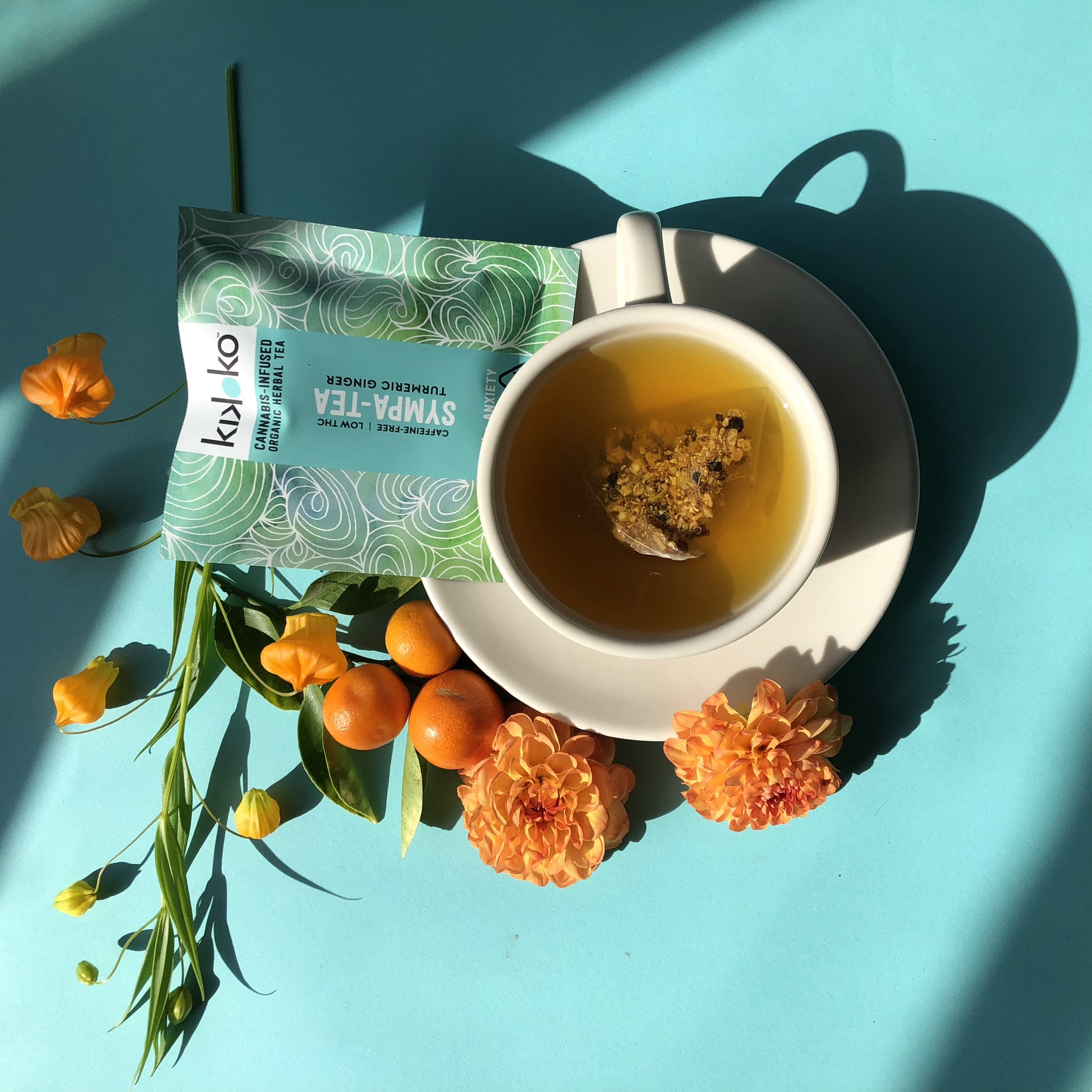Amanda Jones by Claudia Goetzelmann
Kikoko co-founders Amanda Jones and Jennifer Chapin are two of the unlikeliest candidates to be sitting atop a California cannabis empire.
Jones was a globe-trotting, Kiwi-travel-writing mother of two who spent more than two decades living out of a suitcase – 10 of those dedicated to photographing tribes. Chapin was a business consultant and certified life coach. Both were 50-something women with little experience with weed and plenty on their plates, both professionally and personally.
And then their friend, Jan, got terminal ovarian cancer, and their lives took a heartbreaking, life-changing, career-bending turn.
Jan (they prefer to keep her last name private) was using cannabis to increase her appetite and to alleviate her pain and insomnia. But she didn’t like being too stoned to function.
Taking on the stoner culture
So Jones and Chapin searched for an alternative. And they were thrust into a tie-dyed, pot-leaf-decorated, Cheech-and-Chong stoner cannabis culture that didn’t meet the unique needs of women.
They also discovered there are a lot of women who can benefit from the anxiety-relieving, sleep-inducing, pain-fighting qualities of cannabis – from stressed out 30 year old’s to menopausal women dealing with the aches and pains of growing older.
“We spoke to hundreds of women, and most of them didn’t want to get ravingly high,” she says. “They wanted help with different medical conditions, and their needs weren’t being met.”
In 2015, they launched Kikoko – their women-run, women-centric luxury cannabis tea company – in Emeryville, across the bay from San Francisco.
“We wanted to break the stigma and make cannabis a more upscale offering,” says Jones, who studied neurophysiology at the University of Auckland. “We wanted to create products designed for women, dosed for women, titrated for women, with more information than what was out there at the time.”
A little THC goes a long way
Jones believes that a little THC goes a long way, and there weren’t many cannabis products available at lower doses (Kikoko’s products range from 1 mg to 10 mg of THC.) But naysayers told them there wasn’t a market for these types of products.
“We looked at each other and said ‘Nah, that’s a very male perspective,'” Jones recalls. “We were the only tea on the market, our timing was good, our packaging was the strongest on the market and we offered low doses for women. When we launched, we very smugly had a waiting list of dispensaries who wanted our products.”
Their hunch has paid off in a big way. Since launching four and a half years ago, and a product launch two and a half years ago, Kikoko is now sold in more than 300 dispensaries around California, with revenues in the millions and annual growth rate of more than 100 percent this year. “Kikoko – with revenues doubling over the past year – is now the 11th largest edibles brand in the state,” says Jones.
They currently sell four different teas and four New Zealand Manuka & Kanuka Honeyshots, with different ratios of THC and CBD as well as other ingredients – such as ginger, chamomile, and melatonin to address different needs.

Riding the cannabis wave
Kikoko is a part of a booming market, with U.S. cannabis sales estimated at $12 billion in 2018, a growth projected to soar to $32 billion globally by 2022, according to “The State of Legal Marijuana Markets, Sixth Edition” Arcview Group. Edibles and concentrates are the fastest growing segments of the market.
Kikoko has raised $14 million to fuel its meteoric growth. For now, the focus is on expanding within California – the largest cannabis market in the world – before expanding into other states and countries.
Later this year, Kikoko will launch a line of tinctures as well as a line of mints called Little Helpers, with CBD, THC and other “adaptogenic herbs” in the products such as GABA, melatonin and L-Theanine.
“It was honestly a crazy dream – a grand experiment,” Jones says. “But I’m happy to say we’re still standing, and we’re the No. 1 cannabis beverage in California. We want to be the leading women’s cannabis wellness company.”
Cannabis tea: a hard nut to crack
Being a cannabis entrepreneur has its own unique challenges.
Because of the unique properties of cannabis, it can be tough to formulate products that both work and taste good. And because they were the first to formulate a cannabis tea, it took Jones and Chapin two years and three teams of scientists “to crack the nut.” Initially, the tea “tasted horrible,” she admits.
With the industry still in its infancy and the laws barely catching up to the changes, government regulations have been a particular pain point for companies like Kikoko. That makes marketing, raising money, and expansion particularly difficult.
“We cannot advertise in traditional ways, such as on social media,” she says. “It’s all so restricted.”
Kikoko has discovered a creative way to market its products: “High Tea Parties.” The tea parties started as a way for Jones and Chapin to thank the friends and family who served as their guinea pigs and helped them along the journey.
As soon as the tea starts kicking in…
“They were such a success that we started to do more of them,” she says. “As soon as the tea starts kicking in, women are having amazing conversations, making new friends and the energy in the room is fabulous. Nobody wants to leave!”
Although Jones says she’s been involved with over 100 High Tea Parties, Kikoko now encourages people to throw your own tea parties. Among their tips: “DO think about serving half cups to the really nervous guests,” “DO let your hair down” and DON’T serve alcohol to people drinking tea. (Think of the money you’ll save!)”
We were curious about the products, so we drove to a local MedMen Dispensary in San Diego to take a look. We immediately understood by Kikoko’s branding has created such a buzz.
Alongside Smokiez Edibles Fruit Chews and the tins of Mr. Moxey’s Mints – Kikoko demands your attention. The colorful, eye-catching designs are whimsical and fresh, created by female artists like fine artist, illustrator, author and style maven Lisa Congdon and Susan Black, a photographer, and fine artist. With names like Sympa-Tea, Positivi-Tea and Honeyshot Snooze, the labels clearly communicate what is in them and their purpose.
They have the vibe of products you’d find at a Sephora rather than a cannabis dispensary.
“We created products that we would want to buy ourselves,” Jones says.
Calm, centered and powerful
As Kikoko has soared, it has become a powerful voice for other women, both within and outside the company.
They go out of their way to hire women; 85 percent of the company’s 40 employees are women. The Kikoko web site proudly proclaims they won’t do business with people “who are patronizing, discriminating, amoral or who mansplain.” And many of their employees are over 50 – Kikoko’s own way of battling Silicon Valley’s epidemic of ageism.
“We love our millennials, but there’s nothing like having a calm, centered, no-drama, no bullshit, 50-year-old woman walk through the doors,” Jones says. “They command the room, they’re wise and they’ve learned from their mistakes. We have this enormous untapped population of experienced people who have been aged out of leadership roles, and it’s a colossal societal error.”
A wonderful mess of reinvention
Jones concedes that running a multimillion-dollar cannabis business “isn’t the retirement I imagined.”
She does take time to hike with her two rescue mutts, does TRX in her garage, and eats “relatively healthy.” At night, rather than a glass of wine, she drinks cannabis cocktails made from chilled Kikoko tea. “I prefer the effect of cannabis to alcohol,” she says.
Jones says Kikoko has enabled her to stretch and to learn the skills required to build a successful business. It’s a process that can be scary, uncomfortable and exhilarating.
“I’ve had to do things I’ve never done before in my life,” says Jones. “Because I didn’t have much marketing expertise, it actually benefited us in the beginning. We said a lot of ‘Why Nots?’ We took some risks and broke some rules. We came across as authentic and honest and really resonated with women. There’s something about the learner mind that can bring a new perspective to a field.”
It wasn’t the career she expected, but Jones is exactly where she belongs.
“I was riding the Titanic of journalism down. I was on the top deck of lounge chairs, but the water was around my ankles,” Jones says. “And then I was 52 years old, starting a business with one of my best friends. This has been a wonderful mess of reinvention for me.”
The ideas expressed here are solely the opinions of the author and are not researched or verified by AGEIST LLC, or anyone associated with AGEIST LLC. This material should not be construed as medical advice or recommendation, it is for informational use only. We encourage all readers to discuss with your qualified practitioners the relevance of the application of any of these ideas to your life. The recommendations contained herein are not intended to diagnose, treat, cure or prevent any disease. You should always consult your physician or other qualified health provider before starting any new treatment or stopping any treatment that has been prescribed for you by your physician or other qualified health provider. Please call your doctor or 911 immediately if you think you may have a medical or psychiatric emergency.
AUTHOR

We will never sell or give your email to others. Get special info on Diet, Exercise, Sleep and Longevity.


